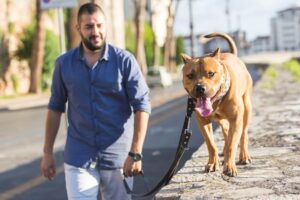How Do You Prove Liability in a Dog Bite Case in Georgia?

A dog bite or attack is a traumatizing experience for anyone. Trying to recover compensation from a negligent dog owner can be challenging in its own right. Dog bite cases are often complicated. It takes certain types of evidence to prove liability. If you are unsure what steps to take after a dog bite, you may inadvertently hurt your chances of recovering valuable compensation.
The legal team at R. Alan Cleveland, LLC, knows what is necessary to hold careless dog owners responsible for their pet’s actions. If you have been the victim of a dog bite or attack, learning how to prove liability can help your chances of building a successful claim. Below are tips to keep in mind when man’s best friend turns on you.
The best advice is to contact a dog bite attorney at R. Alan Cleveland, LLC for a free and confidential consultation now.
Can I Sue for a Dog Bite in Georgia?
Contents
The short answer is yes. Individuals injured by a dog may be able to sue the animal’s owner for compensation for losses related to their injuries. Typically, dog bite claims fall into the legal category of “personal injury.” In Georgia, an individual typically has two years from the date of the dog bite incident to file a personal injury lawsuit against the dog’s owner.
What Type of Evidence Do I Need in My Dog Bite Case?
To have the best chance to recover compensation for dog bite injuries, you must have evidence that proves the dog owner is liable for the bite. Georgia’s dog bite laws give victims several ways to prove liability.
First, a victim can use evidence to establish that the dog owner knew, or reasonably should have known, that their animal is aggressive or dangerous. Evidence that may support this claim includes police reports, animal control reports, and medical records. These documents may establish that the dog has bitten people or shown aggressive tendencies in the past, and the owner should have known their dog posed a risk to others. This evidence can help establish that the owner was negligent.
Georgia law also requires dogs to be leashed or under the owner’s control in most circumstances. Depending on local leash laws and ordinances, if the owner did not leash the dog or have it under control, that may be liable for damages the victim suffered in the attack. Photos, videos, and witness statements may help corroborate claims that the animal was not under control at the time of the bite and that the victim did not provoke the animal.
Does Georgia Homeowners’ Liability Insurance Cover Dog Bites?
In most cases, homeowners’ insurance policies will cover dog bite claims. Sometimes this is the most amicable way to get compensation for a dog bite injury, especially when an animal owned by a close friend or family member caused the injury.
The Insurance Information Institute estimates that injuries from dog bites cost insurers over $1 billion nationally in just one recent year. Their list ranks Georgia 10th in the nation for the number of dog bite claims made to insurers.
While most homeowners’ insurance policies do include coverage for dog bites, there are some notable exceptions, depending on the insurance provider. Some providers will not cover a dog bite if the insurer has breed restrictions in place. Some insurers will refuse to cover dogs considered “dangerous breeds” or “high-risk” in terms of biting and aggression.
 Often the breeds include pit bulls, Rottweilers, and sometimes German shepherds, but the list can vary depending on the provider. Additionally, a policy may not cover dogs who already have a history of biting.
Often the breeds include pit bulls, Rottweilers, and sometimes German shepherds, but the list can vary depending on the provider. Additionally, a policy may not cover dogs who already have a history of biting.
What Should I Do If a Dog Has Bitten Me in Georgia?
First, get medical attention immediately after sustaining a dog bite. Dogs are powerful animals, and a bite can cause immense physical damage. However, even minor bites can cause tissue damage and can quickly spread disease or become infected.
Dog bites can cause:
- Puncture wounds
- Scrapes
- Cuts
- Broken bones
- Nerve damage
- Facial injuries
- MRSA
- Tetanus
- Pasteurella
- Capnocytophaga
- Rabies
Medical documentation is also an essential element of any dog bite claim. Be sure to keep all doctor’s follow-up appointments and thoroughly follow the doctor’s treatment plan.
Contact animal control officers if your community provides these services. What is the average settlement for dog bite cases in Georgia?
If possible, get the name of the animal’s owner and their contact information. Try to gather witness contact information as well. See if the dog’s owner can provide the vaccination records of their animal as well.
Take pictures of your wounds and try to keep all clothing you wore at the time of the incident. Do not wash it or throw it away since it may provide vital evidence in a dog bite claim. You should also refrain from discussing the incident on social media. Your words, no matter how innocent they seem, may be twisted or used against you in court or by an insurer.
If a dog has bitten you, you need to consult with an experienced dog bite attorney. An attorney can help investigate the incident and gather crucial evidence for your claim. An attorney can also handle all communication and negotiation with the liable party’s insurer. Legal representation can help maximize your chances of obtaining full and fair compensation for your injuries.
Get Help from Our Experienced Georgia Dog Bite Lawyers
If a dog has bitten you or someone close to you, talk to the legal team at R. Alan Cleveland, LLC, today. We have been helping injured people in Georgia recover compensation for years. We want to help you pursue the money you deserve.
You shouldn’t have to suffer financial strain and tackle a complicated dog bite case on your own. Let us leverage our experience and resources to protect your rights and interests. Contact us today for a free, no-obligation consultation.

An Athens resident Alan Cleveland grew up in Rockdale County. As a founding partner of the personal injury law firm of R. Alan Cleveland, LLC he proudly serves his community and provides skilled representation to injury victims and their families all around Georgia. Alan earned his undergraduate degree from the University of Georgia and went on to graduate, summa cum laude, from Atlanta’s John Marshall Law School. He is also a graduate of Gerry Spence’s renowned Trial Lawyers College (TLC) in Wyoming. In his free time, Alan frequently speaks at continuing legal education seminars. He also volunteered as a youth baseball coach and assists with Georgia’s high school moot court competition held annually. Alan serves as a Trustee of Historic Athens and is a member of the Development Authority of the Unified Government of Athens-Clarke County.
